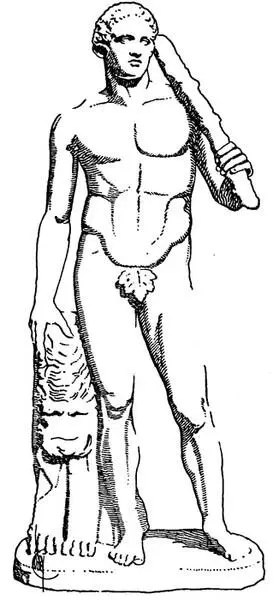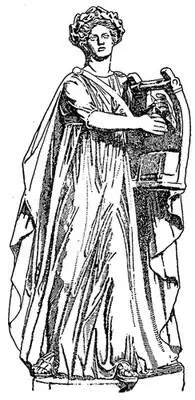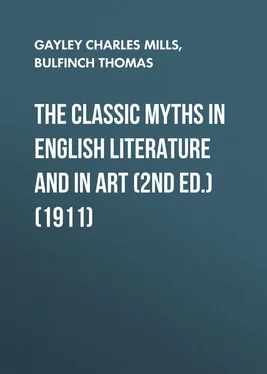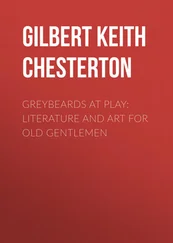Thomas Bulfinch - The Classic Myths in English Literature and in Art (2nd ed.) (1911)
Здесь есть возможность читать онлайн «Thomas Bulfinch - The Classic Myths in English Literature and in Art (2nd ed.) (1911)» — ознакомительный отрывок электронной книги совершенно бесплатно, а после прочтения отрывка купить полную версию. В некоторых случаях можно слушать аудио, скачать через торрент в формате fb2 и присутствует краткое содержание. Жанр: foreign_antique, foreign_prose, на английском языке. Описание произведения, (предисловие) а так же отзывы посетителей доступны на портале библиотеки ЛибКат.
- Название:The Classic Myths in English Literature and in Art (2nd ed.) (1911)
- Автор:
- Жанр:
- Год:неизвестен
- ISBN:нет данных
- Рейтинг книги:4 / 5. Голосов: 1
-
Избранное:Добавить в избранное
- Отзывы:
-
Ваша оценка:
- 80
- 1
- 2
- 3
- 4
- 5
The Classic Myths in English Literature and in Art (2nd ed.) (1911): краткое содержание, описание и аннотация
Предлагаем к чтению аннотацию, описание, краткое содержание или предисловие (зависит от того, что написал сам автор книги «The Classic Myths in English Literature and in Art (2nd ed.) (1911)»). Если вы не нашли необходимую информацию о книге — напишите в комментариях, мы постараемся отыскать её.
The Classic Myths in English Literature and in Art (2nd ed.) (1911) — читать онлайн ознакомительный отрывок
Ниже представлен текст книги, разбитый по страницам. Система сохранения места последней прочитанной страницы, позволяет с удобством читать онлайн бесплатно книгу «The Classic Myths in English Literature and in Art (2nd ed.) (1911)», без необходимости каждый раз заново искать на чём Вы остановились. Поставьте закладку, и сможете в любой момент перейти на страницу, на которой закончили чтение.
Интервал:
Закладка:
Just after the funeral procession had left the palace, Hercules, the son of Jupiter and Alcmena, arrived. He, to whom no labor was too arduous, resolved to attempt her rescue. Said he:
"I will go lie in wait for Death, black-stoled
King of the corpses! 103 103 From Browning's Balaustion's Adventure. The Greek form of the proper names has been retained.
I shall find him, sure,
Drinking, beside the tomb, o' the sacrifice:
And if I lie in ambuscade, and leap
Out of my lair, and seize – encircle him
Till one hand join the other round about —
There lives not who shall pull him out from me,
Rib-mauled, before he let the woman go!
But even say I miss the booty, – say,
Death comes not to the boltered blood, – why, then,
Down go I, to the unsunned dwelling-place
Of Koré 104 104 Proserpine.
and the king there, – make demand,
Confident I shall bring Alkestis back,
So as to put her in the hands of him
My host, that housed me, never drove me off:
Though stricken with sore sorrow hid the stroke,
Being a noble heart and honoring me!
Who of Thessalians, more than this man, loves
The stranger? Who that now inhabits Greece?
Wherefore he shall not say the man was vile
Whom he befriended, – native noble heart!"
So, one look upward, as if Zeus might laugh
Approval of his human progeny, —
One summons of the whole magnific frame,
Each sinew to its service, – up he caught,
And over shoulder cast the lion-shag,
Let the club go, – for had he not those hands?
And so went striding off, on that straight way
Leads to Larissa and the suburb tomb.
Gladness be with thee, Helper of our world!
I think this is the authentic sign and seal
Of Godship that it ever waxes glad,
And more glad, until gladness blossoms, bursts
Into a rage to suffer for mankind,
And recommence at sorrow: drops like seed
After the blossom, ultimate of all.
Say, does the seed scorn earth and seek the sun?
Surely it has no other end and aim
Than to drop, once more die into the ground,
Taste cold and darkness and oblivion there:
And thence rise, tree-like grow through pain to joy,
More joy and most joy, – do man good again.
So to the struggle off strode Herakles.

Fig. 65. Heracles
Long time the Thessalians waited and mourned. As for Herakles, no doubt they supposed him dead. When – but can it be?
… Ay, he it was advancing! In he strode,
And took his stand before Admetos, – turned
Now by despair to such a quietude,
He neither raised his face nor spoke, this time,
The while his friend surveyed him steadily.
That friend looked rough with fighting: had he strained
Worst brute to breast was ever strangled yet?
Somehow, a victory – for there stood the strength,
Happy, as always; something grave, perhaps;
The great vein-cordage on the fret-worked front,
Black-swollen, beaded yet with battle-dew
The golden hair o' the hero! – his big frame
A-quiver with each muscle sinking back
Into the sleepy smooth it leaped from late.
Under the great guard of one arm, there leant
A shrouded something, live and woman-like,
Propped by the heartbeats 'neath the lion-coat.
When he had finished his survey, it seemed,
The heavings of the heart began subside,
The helpful breath returned, and last the smile
Shone out, all Herakles was back again,
As the words followed the saluting hand.
"Admetus," said he, "take and keep this woman, my captive, till I come thy way again." But Admetus would admit no woman into the hall that Alcestis had left empty. Then cried Herakles, "Take hold of her. See now, my friend, if she look not somewhat like that wife thou hast lost."
Ah, but the tears come, find the words at fault!
There is no telling how the hero twitched
The veil off; and there stood, with such fixed eyes
And such slow smile, Alkestis' silent self!
It was the crowning grace of that great heart,
To keep back joy: procrastinate the truth
Until the wife, who had made proof and found
The husband wanting, might essay once more,
Hear, see, and feel him renovated now —
Able to do now all herself had done,
Risen to the height of her: so, hand in hand,
The two might go together, live and die.
Beside, when he found speech, you guess the speech.
He could not think he saw his wife again:
It was some mocking God that used the bliss
To make him mad! Till Herakles must help:
Assure him that no specter mocked at all;
He was embracing whom he buried once,
Still, – did he touch, might he address the true,
True eye, true body of the true live wife?
… And Herakles said little, but enough —
How he engaged in combat with that king
O' the dæmons: how the field of contest lay
By the tomb's self: how he sprang from ambuscade,
Captured Death, caught him in that pair of hands.
But all the time, Alkestis moved not once
Out of the set gaze and the silent smile;
And a cold fear ran through Admetos' frame:
"Why does she stand and front me, silent thus?"
Herakles solemnly replied, "Not yet
Is it allowable thou hear the things
She has to tell thee; let evanish quite
That consecration to the lower Gods,
And on our upper world the third day rise!
Lead her in, meanwhile; good and true thou art,
Good, true, remain thou! Practice piety
To stranger-guests the old way! So, farewell!
Since forth I fare, fulfill my urgent task
Set by the king, the son of Sthenelos." 105 105 For the originals, see Iliad, 2, 715, and the Alcestis of Euripides.

Fig. 66. The Palatine Apollo
84. Apollo, the Musician.Not only in Arcadia, Laconia, and Thessaly did Apollo care as a herdsman for the cattle of a mortal master; in Mount Ida, too, by the order of Jupiter he herded for a year the "shambling, crook-horned kine" of King Laomedon, and, playing on the lyre, aided Neptune to build the walls of Troy, just as Amphion, in his turn, had aided in the building of Thebes. Apollo's life as herdsman was spent in establishing wise laws and customs, in musical contests on the flute and the lyre, or in passages of love with nymphs and maidens of mortal mold.
85. Apollo, Pan, and Midas. 106 106 Ovid, Metam. 11, 146-193.
It is said that on a certain occasion Pan had the temerity to compare his music with that of Apollo and to challenge the god of the lyre to a trial of skill. The challenge was accepted, and Tmolus, the mountain-god, was chosen umpire. The senior took his seat and cleared away the trees from his ears to listen. At a given signal Pan blew on his pipes, and with his rustic melody gave great satisfaction to himself and his faithful follower Midas, who happened to be present. Then Tmolus turned his head toward the sun-god, and all his trees turned with him. Apollo rose, his brow wreathed with Parnassian laurel, while his robe of Tyrian purple swept the ground. In his left hand he held the lyre and with his right hand struck the strings. Tmolus at once awarded the victory to the lyric god, and all but Midas acquiesced in the judgment. He dissented and questioned the justice of the award. Apollo promptly transformed his depraved pair of ears into those of an ass.
King Midas tried to hide his misfortune under an ample turban. But his hair-dresser found it too much for his discretion to keep such a secret; he dug a hole in the ground and, stooping down, whispered the story, and covered it up. But a thick bed of reeds springing up in the meadow began whispering the story, and has continued to do so from that day to this, every time a breeze passes over the place.
Читать дальшеИнтервал:
Закладка:
Похожие книги на «The Classic Myths in English Literature and in Art (2nd ed.) (1911)»
Представляем Вашему вниманию похожие книги на «The Classic Myths in English Literature and in Art (2nd ed.) (1911)» списком для выбора. Мы отобрали схожую по названию и смыслу литературу в надежде предоставить читателям больше вариантов отыскать новые, интересные, ещё непрочитанные произведения.
Обсуждение, отзывы о книге «The Classic Myths in English Literature and in Art (2nd ed.) (1911)» и просто собственные мнения читателей. Оставьте ваши комментарии, напишите, что Вы думаете о произведении, его смысле или главных героях. Укажите что конкретно понравилось, а что нет, и почему Вы так считаете.












